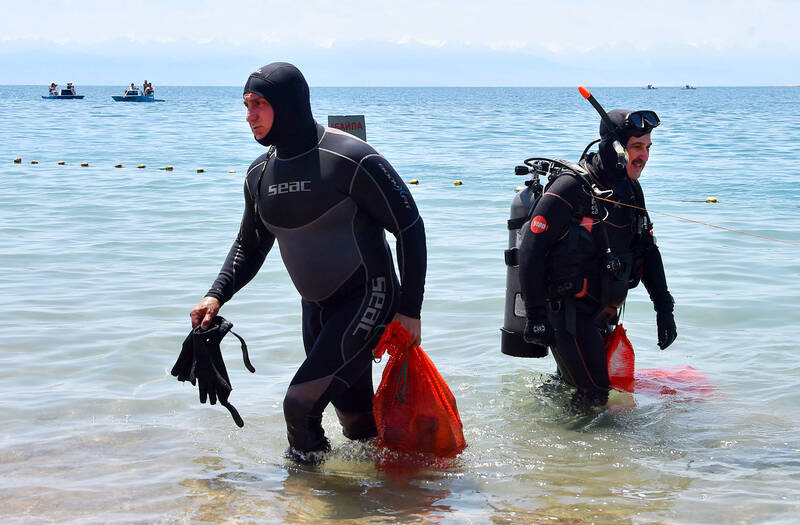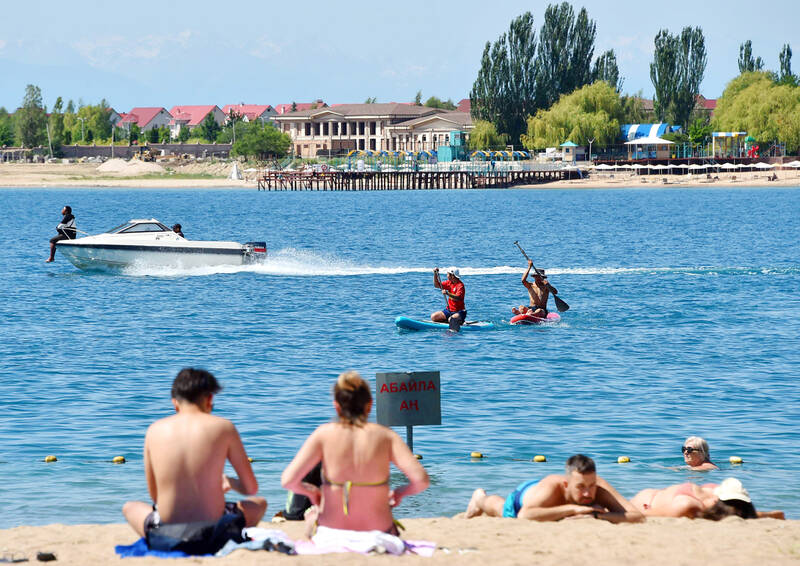On the shores of Lake Issyk Kul in mountainous Kyrgyzstan, a group of divers show off their haul for the day — a boat engine, car tyres, bottles, clothes and plastic items.
“We would love to dive and not find any waste,” said Anvar Shamsutdinov, the moustachioed 59-year-old leader of a dozen-strong team of volunteer scuba enthusiasts.
“The beach looks clean but people don’t realize what’s underwater,” he said, as tourists stopped to look.

Photo: AFP
Surrounded by snowy Central Asian peaks over 4,000 meters tall, Issy Kul is the second largest high mountain lake in the world.
The year’s brief but intense summer high season has just got under way in this picturesque region of the former Soviet republic, where the nearest seaside is thousands of kilometers away.
But the flow of visitors and the rubbish they leave behind are endangering this vast lake known as the “pearl of Kyrgyzstan” — whose pristine waters are highly vulnerable to pollution.

Photo: AFP
The lake area is a UNESCO heritage site, a home for wolves and eagles and a wintering ground for tens of thousands of migrating waterbirds.
“In 2014, we were doing some underwater orientation and we realized the situation under water was terrible,” Shamsutdinov said.
“So we decided to clean up the lake,” said the diver, who estimates he has collected 20 tonnes of waste since creating his association “Clean Issyk Kul.”
FOR FUTURE GENERATIONS?
On a visit to the lake earlier this year, Kyrgyz President Sadyr Japarov cautioned about the dangers and urged the public to preserve the lake.
“Why is there so much indifference and insensitivity towards our beloved lake?” he asked. “Cleanliness is about cleaning up. It’s about not dumping rubbish in the first place.”
The emergency situations ministry has also sent divers to help Shamsuddinov and his team of volunteers.
These initiatives are all welcomed by Gulzam Satybaldieva, who runs a shop on the beach at one of the lake’s main resorts, Cholpon-Ata, and is grateful to “divers who are sensitive to environmental problems.”
“If tourists and (local residents) followed their example, we would be able to pass on a clean lake to future generations,” she said.
But in Kyrzgystan, as in the whole of Central Asia, the recycling industry suffers from underinvestment and the problems at Issyk Kul point to broader environmental issues, like smog from coal burning and nuclear waste lingering from the Soviet period.
“We haven’t cleaned the lake in 30 years — since independence” from the Soviet Union, said Aidar Kaptagayev, a diver from the emergency situations ministry. He has been diving in the lake since March at depths of up to 40 metres to get rubbish out.
BRINGING SHAME
Apart from petrol and waste from factories and other industrial facilities, which put at risk the lake’s plant life, plastic and fishing nets endanger animals.
But environmental awareness is slow to take hold.
Shamsutdinov said he and his team are sometimes even accused of “bringing shame” on the country by showing how much waste is thrown in the water.
The manager of a cafe on the lake shore, Ruslan Myrzalyev, said that “some tourists don’t really respect rules on waste, despite requests”.
Vera Argokova, a 62-year-old tourist from Russia’s Altai region, said she was particularly careful.
“We do not bring food onto the beach, only a bottle. We want everything to stay clean,” said Argokova, who was staying at the “Blue Issyk Kul” sanatorium, decorated with Soviet-era statues including one of Lenin.
“We don’t want to be relaxing surrounded by rubbish.”

Cheng Ching-hsiang (鄭青祥) turned a small triangle of concrete jammed between two old shops into a cool little bar called 9dimension. In front of the shop, a steampunk-like structure was welded by himself to serve as a booth where he prepares cocktails. “Yancheng used to be just old people,” he says, “but now young people are coming and creating the New Yancheng.” Around the corner, Yu Hsiu-jao (饒毓琇), opened Tiny Cafe. True to its name, it is the size of a cupboard and serves cold-brewed coffee. “Small shops are so special and have personality,” she says, “people come to Yancheng to find such treasures.” She

Late last month Philippines Foreign Affairs Secretary Theresa Lazaro told the Philippine Senate that the nation has sufficient funds to evacuate the nearly 170,000 Filipino residents in Taiwan, 84 percent of whom are migrant workers, in the event of war. Agencies have been exploring evacuation scenarios since early this year, she said. She also observed that since the Philippines has only limited ships, the government is consulting security agencies for alternatives. Filipinos are a distant third in overall migrant worker population. Indonesia has over 248,000 workers, followed by roughly 240,000 Vietnamese. It should be noted that there are another 170,000

Hannah Liao (廖宸萱) recalls the harassment she experienced on dating apps, an experience that left her frightened and disgusted. “I’ve tried some voice-based dating apps,” the 30-year-old says. “Right away, some guys would say things like, ‘Wanna talk dirty?’ or ‘Wanna suck my d**k?’” she says. Liao’s story is not unique. Ministry of Health and Welfare statistics show a more than 50 percent rise in sexual assault cases related to online encounters over the past five years. In 2023 alone, women comprised 7,698 of the 9,413 reported victims. Faced with a dating landscape that can feel more predatory than promising, many in

Former Chinese Nationalist Party (KMT) chairwoman Hung Hsiu-chu’s (洪秀柱) attendance at the Chinese Communist Party’s (CPP) “Chinese People’s War of Resistance Against Japanese Aggression and the World Anti-Fascist War” parade in Beijing is infuriating, embarrassing and insulting to nearly everyone in Taiwan, and Taiwan’s friends and allies. She is also ripping off bandages and pouring salt into old wounds. In the process she managed to tie both the KMT and the Democratic Progressive Party (DPP) into uncomfortable knots. The KMT continues to honor their heroic fighters, who defended China against the invading Japanese Empire, which inflicted unimaginable horrors on the